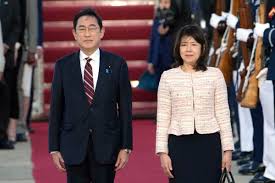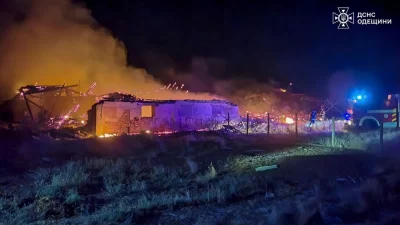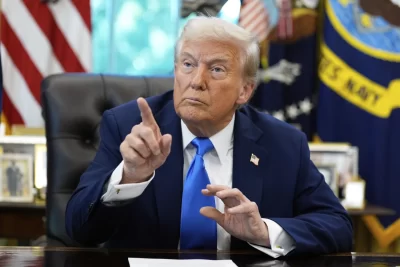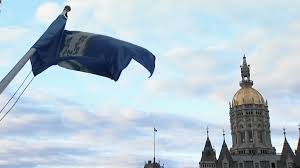
WASHINGTON— Japanese Prime Minister Fumio Kishida begins a much-anticipated visit to Washington on Tuesday aiming to spotlight shared concerns about provocative Chinese military action in the Pacific and at a rare moment of public difference between the two nations over a Japanese company’s plan to buy an iconic U.S. company.
Kishida and his wife will stop by the White House Tuesday evening ahead of Wednesday’s official visit and formal state dinner as President Joe Biden looks to celebrate a decades-long ally he sees as the cornerstone of his Indo-Pacific policy. Kishida will be the fifth world leader honored by Biden with a state dinner since he took office in 2021.
Ahead of the White House visit, Kishida is set to visit Arlington National Cemetery and stop by the U.S. Chamber of Commerce Tuesday. Biden and Kishida on Wednesday will hold talks and take part in a joint news conference before Biden fetes the Japanese leader with the state dinner in the East Room.
The prime minister has also been invited to address a joint meeting of Congress on Thursday. He will be just the second Japanese leader to address the body; Shinzo Abe gave a speech to Congress in 2015.
The visit comes after Biden announced last month that he opposes the planned sale of Pittsburgh-based U.S. Steel to Nippon Steel of Japan, exposing a marked rift in the partnership at the very moment the two leaders aim to reinforce it. Biden argued in announcing his opposition that the U.S. needs to “maintain strong American steel companies powered by American steelworkers.”
Ambassador Rahm Emanuel, Biden’s envoy to Tokyo, sought Monday to downplay the impact of Biden’s opposition to the U.S. Steel acquisition to the relationship. Emanuel noted that in February the Biden administration approved a plan that would drive billions of dollars in revenue to a U.S.-based subsidiary of the Japanese company Mitsui for crane production in the United States.
“The United States relationship with Japan is a lot deeper and stronger and more significant than a single commercial deal,” said Emanuel, the former mayor of Chicago, in a joint appearance at Washington’s Center for Strategic and International Studies with Japan’s chief envoy to Washington. “As we would say in Chicago, you got to chill.”
Nippon Steel announced in December that it planned to buy U.S. Steel for $14.1 billion in cash, raising concerns about what the transaction could mean for unionized workers, supply chains and U.S. national security. Shigeo Yamada, Japan’s ambassador to Washington, declined to comment on whether Kishida would raise the Nippon-U.S. Steel deal with Biden.
Biden has sought to place greater foreign policy focus on the Pacific even while grappling with the fallout of the Russian invasion of Ukraine and the grinding Israel-Hamas war. Last year, Biden brought together Kishida and South Korean President Yoon Suk Yeol at the presidential retreat at Camp David, Maryland, a historic summit between leaders of two countries that have a difficult shared history.
Biden has honored Yoon with a state visit and picked Kishida’s predecessor, Prime Minister Yoshihide Suga, as the first face-to-face foreign leader visit of his presidency.
The administration has been pleased by Japan’s strong support for Ukraine. Tokyo has been one of the largest donors to Kyiv since Russia’s February 2022 invasion, and Japan has surged its defense spending amid concern about China’s military assertiveness.
Yamada suggested in his joint appearance with Emanuel that Kishida would underscore Japan’s support for Ukraine during his appearance before Congress, and lay out why the conflict in Eastern Europe matters to his country. Biden is struggling to get House Republicans to back his call to send an additional $60 billion to Kyiv as it tries to fend off Russia.
Kishida has warned that the war in Europe could lead to conflict in East Asia, suggesting that a lax attitude to Russia emboldens China.
“The prime minister’s conviction is today’s Ukraine could be tomorrow’s East Asia,” Yamada said. Kishida will stick around Washington on Thursday to take part in a meeting with Biden and Philippine President Ferdinand Marcos Jr. Philippine-Chinese relations have been repeatedly tested by skirmishes between the two nations’ coast guard vessels in the disputed South China Sea.
Chinese coast guard ships also regularly approach disputed Japanese-controlled East China Sea islands near Taiwan. Beijing says Taiwan is part of its territory and will be brought under control by force if necessary.
“Cooperation among our three countries is extremely important in maintaining peace and stability in the Indo-Pacific and in defending a free and open international order based on the rules of law,” Kishida said Monday before leaving for Washington.
The leaders are expected to discuss plans to upgrade the U.S. military command structure in Japan. There are about 54,000 U.S. troops stationed in Japan.





